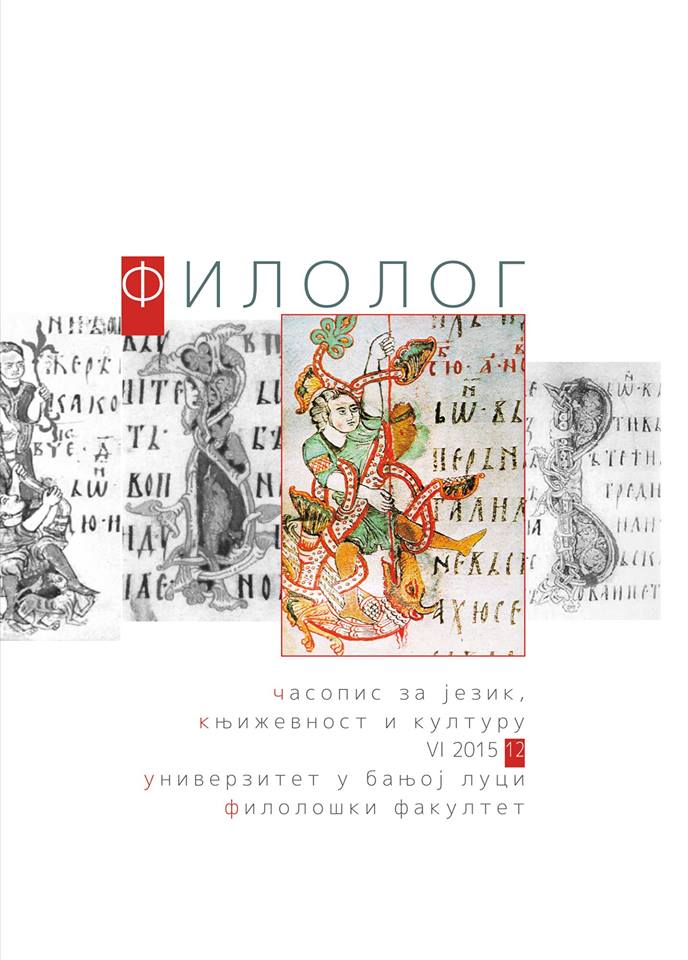
Значајан прилог интегралној стилистици
Review of: Kovačević, Miloš (2015), Stil i jezik srpskih pisaca, prvo izdanje, Biblioteka Tumačenje književnosti, knjiga 22, Beograd: Zavod za udžbenike.
More...We kindly inform you that, as long as the subject affiliation of our 300.000+ articles is in progress, you might get unsufficient or no results on your third level or second level search. In this case, please broaden your search criteria.

Review of: Kovačević, Miloš (2015), Stil i jezik srpskih pisaca, prvo izdanje, Biblioteka Tumačenje književnosti, knjiga 22, Beograd: Zavod za udžbenike.
More...
Review of: Vukičević, Dragana i Snežana Milosavljević Milić (2014), Ogledavanja – Laza Lazarević i Simo Matavulj, Niš: Filozofski fakultet Univerziteta u Nišu.
More...
Review of: Brajović, Tihomir (2015), Groznica i podvig: Ogledi o erotskoj imaginaciji u književnom delu Ive Andrića, Beograd: Geopoetika.
More...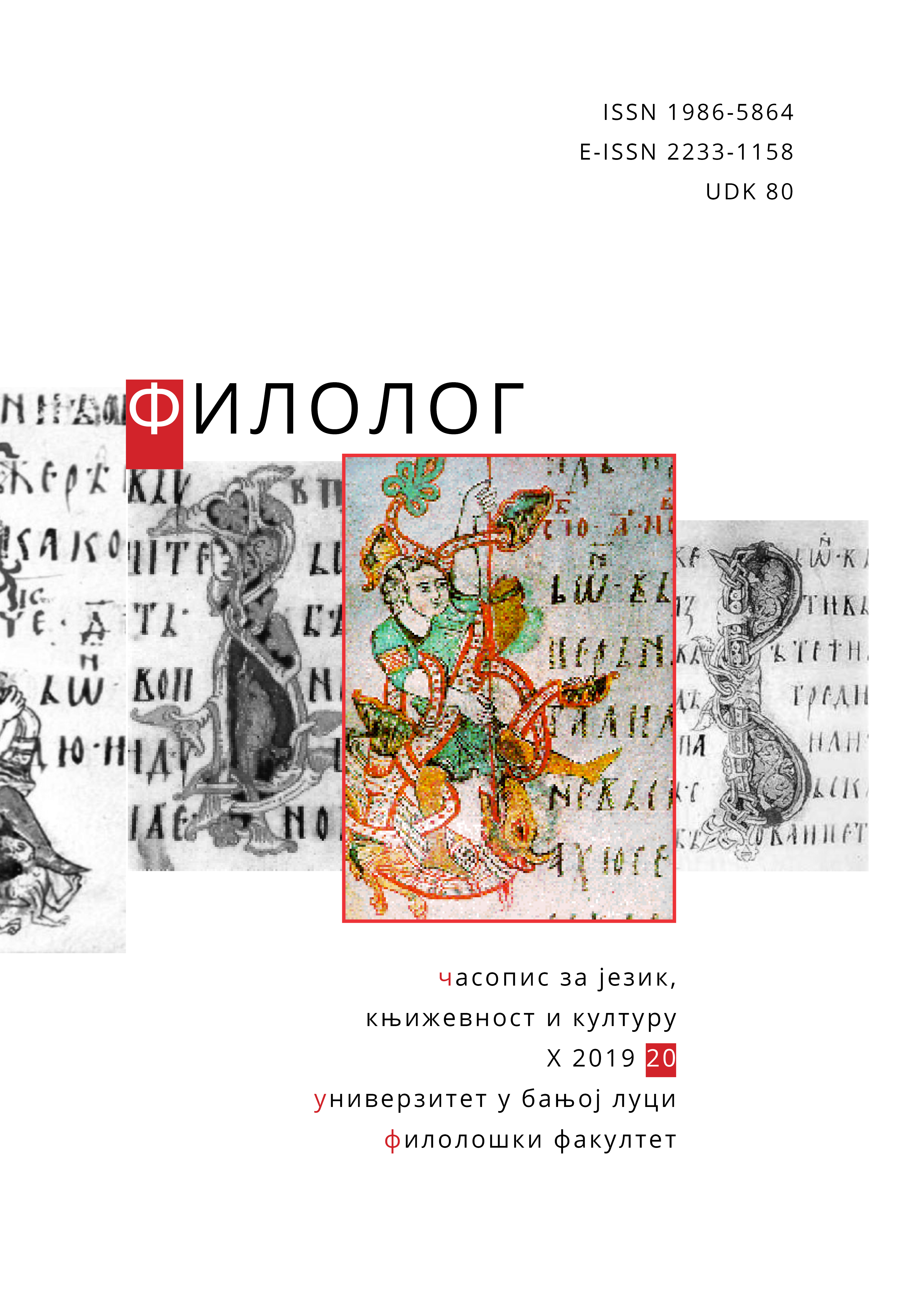
The topic of this paper is the relationship between the genitive and the accusative of direct object in the Old Serbian Novel About Troy (XV century). The competition of two cases is attested in the following categories: 1) after verbs of certain semantic classes (verbs of perception and verbs of striving after a goal), 2) after the infinitive which replaced the supine and 3) in negative constructions. In the oldest stages of the Balto-Slavic branch, the genitive government was most likely the only possible, which later gradually started to be replaced with accusative forms. The syntactic, semantic and statistical analysis was provided. After certain verbs and after the infinitive in the primary supine position the genitive is preserved only in traces. In negative constructions, the percentage ratio (55,56% accusative : 44,44% genitive) indicates a strong competition of two forms, with a slight advantage of the accusative, while the selection of case seems to be determined by hierarchies such as referentiality, the force of negation and morphological distinction of cases. In later stages of the Serbian language, the process of replacing the genitive with the accusative goes on, which is probably caused by the intensive development of syntactic transitivity.
More...
The research featured in this paper focuses on the image of Rome in the Serbian travelogue prose of the 19th and 20th centuries, published within the 1868-1972 period. Apart from works of fiction, we include accounts and articles published in periodicals as well. With a view to shedding light on one of the very significant aspects of the Serbian-Italian cultural and literary ties, in our analysis we pay attention to some almost marginalised pieces dedicated to Rome – a city that has held a prominent position among Serbian tourists in Italy since the second half of the 19th century. Furthermore, we look back on the European travelogue tradition as well, by drawing a parallel between the texts by Serbian travelogue writers featuring Rome and those provided by renowned authors, namely Goethe, Stendhal, and Gogol.
More...
The intention of this paper is the semantic disfiguration of the cultural subtext of black-humorous elements in Dušan Kovačevićʼs comediography, and a method of research is to synthetically discover the meaning on a symbolic plane of the text. The comic elements of Kovačević‘s plays are presented based on the plays: The Marathon Family, Radovan III, Balkan Spy, Claustrophobic Comedy, The Professional, Roaring Tragedy, also, based on film adaptations of plays Balkan Spy and The Professional. The subject of this paper is to determine the genre charcteristics of Dušan Kovačevićʼs comedies, as well as a comparative analysis of parodic in the context of Serbian literature history. An analysis of comic elements is performed based on the theory of drama, comedy and absurdity. This paper discusses the concept of parody and grotesque. The second part of the paper refers to extratextual characterictics that are scenic type of nature and contribute to the atmosphere of black-humorous social regression. The goal of this paper is to relate the characterisation of Dušan Kovačevićʼs dramatic prosèdē as tragicomic. His comedies demonstrate internal aspects and characteristics of tragedy, but the actions of the characters from plays are comic in nature.
More...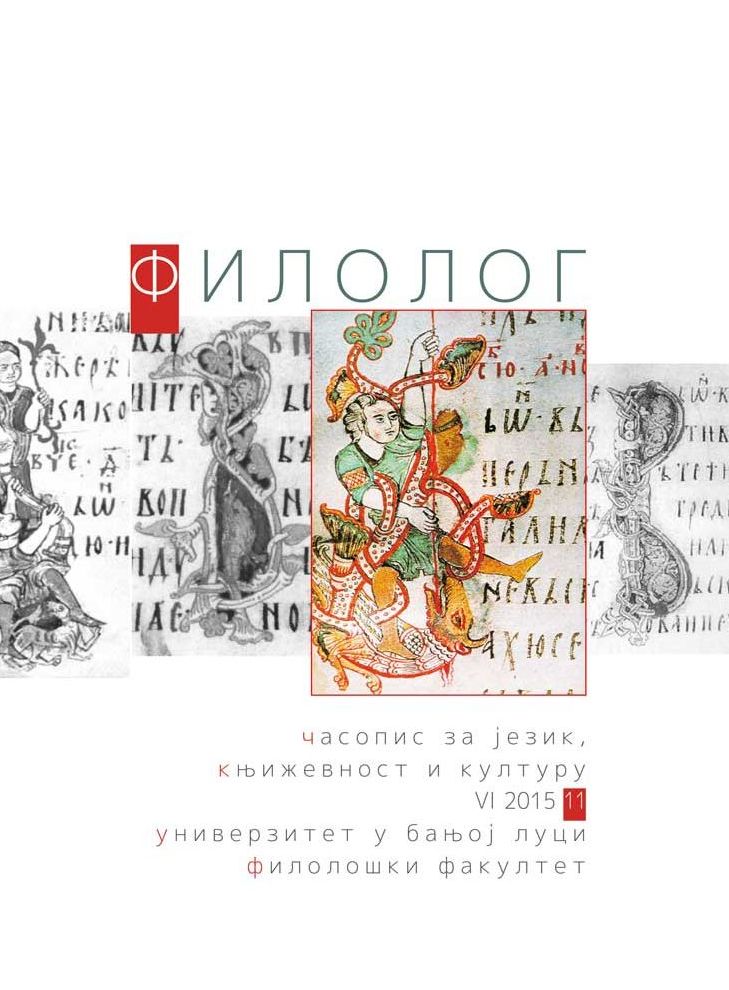
Review of: Zobenica, Nikolina (2014), Književno delo između estetike i politike: Limeni doboš Gintera Grasa u Nemačkoj i Srbiji 1959–2009, Novi Sad: Faculty of Philosophy.
More...
Review of: Novaković, Jelena (2012), Intertekstualna istraživanja, Sremski Karlovci – Novi Sad: Izdavačka knjižarnica Zorana Stojanovića; Novaković, Jelena (2014), Intertekstualna istraživanja II (Srpsko-francuski književni dijalog), Sremski Karlovci – Novi Sad: Izdavačka knjižarnica Zorana Stojanovića.
More...
Review of: Radović, Miodrag (2014), Komparativni kvartet, Novi Sad: Akademska knjiga.
More...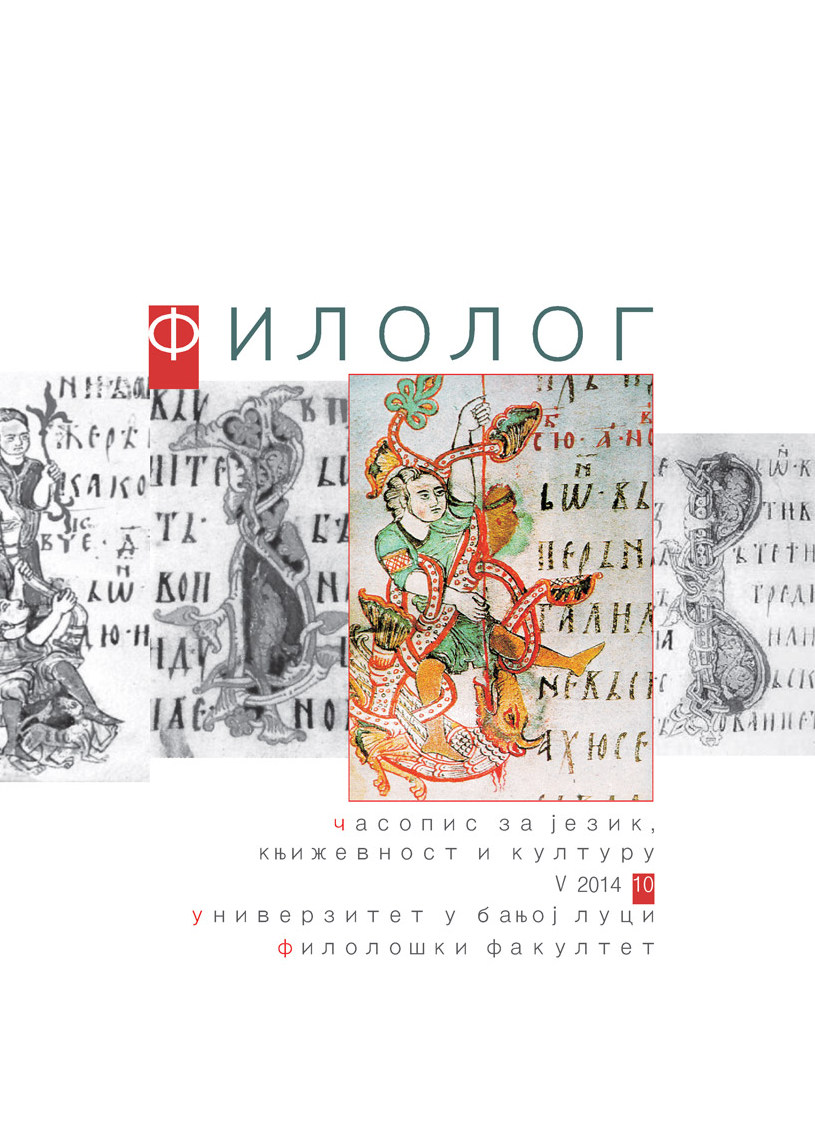
The paper deals with the issues related to translating terms and concepts from Momo Kapor’s short stories. The special focus is placed on solving the problems of non-equivalence, that is, nonexistence of certain terms in the target language, having in mind the fact that most of those terms and concepts also contain a great deal of implied meaning. Consequently, one of the aims of the paper is also to raise the awareness of the complexity of the translator’s task.During the process of analysing the examples of terms for which there is no appropriate translation in the target language, two approaches to translation are contrasted: the text-focused and reader-focused translation. The text-focused translation requires introducing shifts, which contribute to the coherence of the text. Within this approach, the translator takes neither the context of the source text nor the needs of target text readers into account. Th is being the case, the translation is based purely on the linguistic rules.Conversely, in order to achieve the reader-focused translation, the translator introduces shifts that go beyond the surface of linguistic meaning and function of a term. In this case, many different factors participate in creating the same effect on the target text reader as on the source text reader, such as: the implied meaning of a term, target culture, source culture, time, space, etc. Through the analysis of various examples, it has been concluded that it is only this type of approach to translation that allows interpreting the term and then transferring its meaning into target language, thus achieving the aim of creating the associations with the same eff ect in the mind of a target-text reader as in the mind of a source-text reader.
More...
Besides spatial dynamics, Albahari’s literary poetics is to a great extent defined by his religious affiliation. The article aims to show how Albahari’s different personal reference points (Serbia, Canada, Jewishness) build up the image of Albahari as an author comfortable in the emerging multicentric cultural economy.
More...
Review of: Jović, Bojan & Brajović, Tihomir [Eds.] (2013), Pojmovnik uporedne književnosti, Beograd: Institut za književnost i umetnost.
More...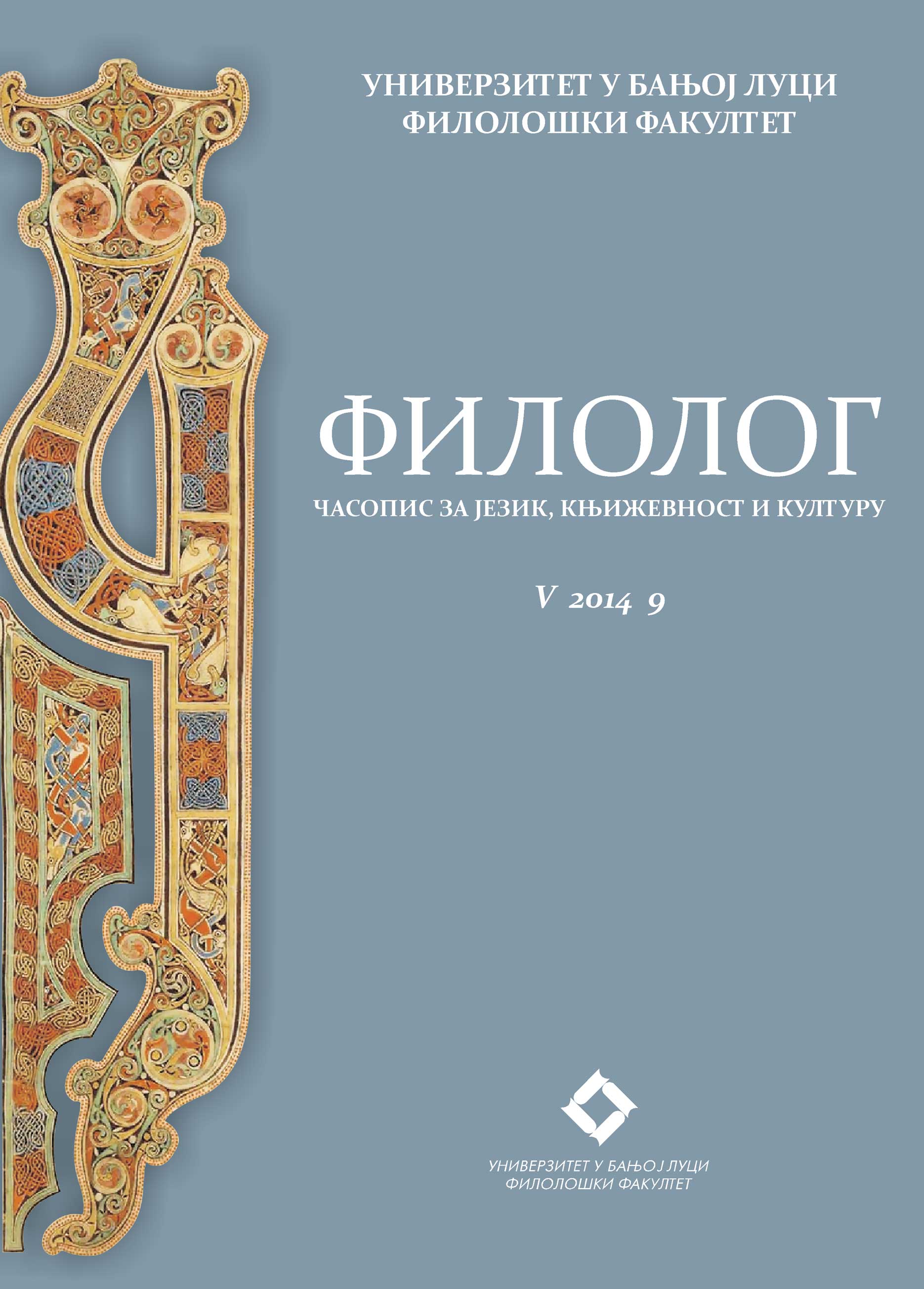
The topic of this research is the semantic analysis of adjectives that denote divine features in “The Hagiography of St. Simeon” by Stefan Prvovenčani. The approach applied in the analysis of semantics is interdisciplinary, using both linguistic and theological aspects, thus opening the possibility of seeing God through the eyes of a medieval person and gaining insight into what was the centre of their attention.
More...
This paper deals with the short story The Trip of Alija Đerzelez, in light of theories of humour by Mikhail Bakhtin, Luigi Pirandello and Aleksandar Bošković. The character of Alija Đerzelez stands out as a dominant literary structure plan through which a humorous effect is achieved in the story. There is a grotesque in his physical characterisation, and creating an atmosphere as the basis for building a character is marked by carnivalisation of liberated consciousness and dialogue communication that lead to the de-mythologising of the main character by subjecting him to the ambivalent carnival laughter first and then to a reflection on its causes.
More...
Review of: Tatarenko, Ala (2013), Poetika forme u prozi srpskog postmodernizma, Beograd: Službeni glasnik.
More...
Review of: Damjanov, Sava (2012), Šta to beše srpska postmoderna?, Beograd: Službeni glasnik.
More...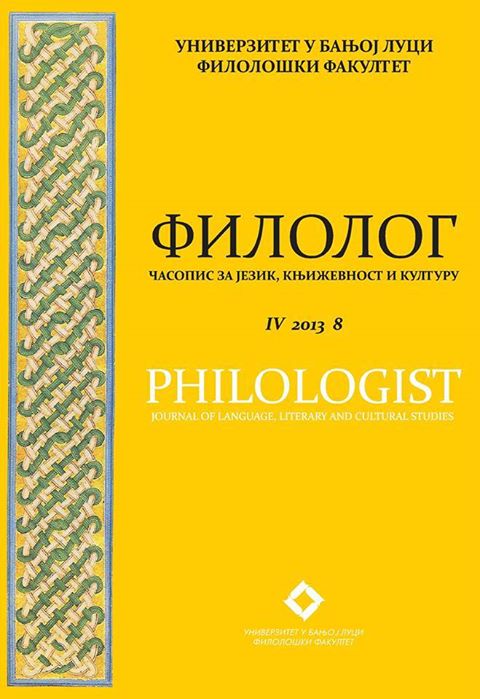
The paper analyses the problems of translation of specific groups of words from Serbian into Italian in the novel Trifle-shop “Lucky hand” by Goran Petrović. Starting from the translation of the title of the novel, in Italy published under the title 69 cassetti (69 drawers), the analysis follows the problems of translation of specific groups of words with special reference to their semantics. The analysis focuses on the phrases difficult for translation, which are directly related to the culture of the Serbian people, as well as on the expressions with characteristics of archaic, colloquial speech or words of foreign origin, and on the compound words that are not characteristic of Serbian literary language but are the main characteristics of the writer’s literary style. The analysis and comparison of the translator’s choices of particular Italian words as the equivalents of the original Serbian words shows that the main problem of a translator’s job is the question of what remains “lost in translation”, and also the problem concerning the translation of the style of a writer like Goran Petrović.
More...
Review of: Vučković, Radovan [Ed.] (2012), Andrić između Istoka i Zapada; Zbornik radova; Banja Luka: Akademija nauka i umjetnosti Republike Srpske.
More...
Review of: Suvajdžić, Boško [Ed.] (2012), Srpsko usmeno stvaralaštvo u interkulturnom kodu; Zbornik radova, Beograd: Institut za književnost i umetnost.
More...
Review of: Miličević, Davor (2012), U ogledalu srpskom, Beograd: Beogradska knjiga.
More...